Stakeholders on Tuesday, October 11, 2022, collaborated to examine economic and social opportunities that would be beneficial from Energy Transition Plan. Global Initiative for Food Security and Ecosystem Preservation (GIFSEP) called on Federal Government and other relevant stakeholders to intensify effort in tackling environmental issues in the country.

GIFSEP, in collaboration with Lift Humanity Foundation (LHF), also called on other stakeholders to support Federal Government for effective implementation of the ETP.
The stakeholders made the call at a one-day workshop in Abuja, organised by the organisations on “Examining the Economic and Social Opportunities from Energy Transition Plan” (ETP) programme.
The Programme Manager of the GIFSEP, Mr Joseph Ibrahim, said that the essence of the workshop was to assess the transition plan and determine the economic and social prospects and the opportunities.
Ibrahim said that recently the Federal Government inaugurated the ETP, adding that the objective of the programme was to achieve universal energy access by 2030.
He said that the aim was also to achieve a carbon-neutral economy by 2060.
The programme manager called on government to involve NGOs and Civil Society Organisations (CSOs) for effective implementation of other environmental programmes and policy.
According to him, “more importantly, we need a system of accountability to encourage people who are willing to support and strengthen the system in the implementation of the programmes.”
He advised that government should take environmental issues seriously, adding that unhealthy and unsafe environment could lead to poverty and increase spread of diseases.
Mr Pius Oko, Executive Secretary of LHF, said that the workshop brought together civil society organisations (CSOs) and other stakeholders to examine the economic and social opportunities and benefit drive from the ETP in the country.
Oko said that the inauguration of the ETP was a pathway to Nigeria’s contribution to address emission from fossil fuel and other non-renewable resources.
Oko said that it was time for Nigeria to take ownership of transition pathways and design climate-sensitive strategies that would tackle peculiar growth objectives.
He said that President Muhammad Buhari had made a commitment that Nigeria would achieve zero-net by year 2060 and ensuring that energy, poverty and climate change crisis was tackled.
He said that the effort would help to deliver Sustainable Development Goal seven (SDG7) by 2030 and net zero by 2060.
According to him, the plan will, among other things, lift people out of poverty, reduce Nigeria’s carbon footprint, drive economic growth and create jobs.
The Director, Centre for Environmental Studies, University of Abuja, Prof. Shuaibu Hassan, said that the evidence-based net-zero compliant energy transition pathway in Nigeria, offered investment opportunities across the value chain.
Hassan said that the value chain was in multiple sectors, regions, and industries in the country.
He said that the Federal Government was committed to a robust and timely inclusive energy transition.
The director said that the transition focused on job creation, growth, and sustainability which seeks to support its net-zero by 2060 ambition.
By Vivian Emoni
